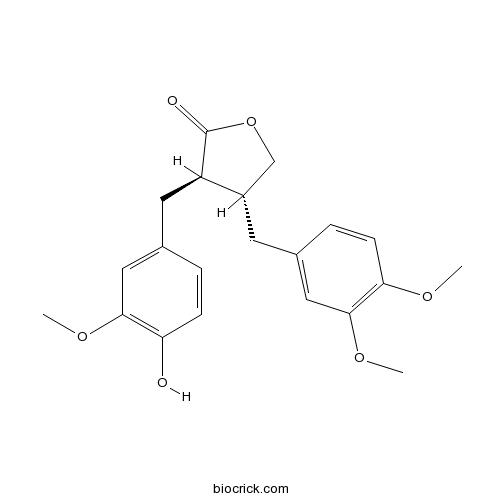Arctigenin, naturally occurring in Bardanae fructus, Saussurea medusa, Arctium lappa L., Torreya nucifera and Ipomea cairica, is a phenylpropanoid dibenzylbutyrolactone lignan with antioxidant and anti-inflammatory activities, it can potently inhibit the activity of MKK1 in vitro with the IC(50) value of 1 nM, and inhibit activation of MAP kinases including ERK1/2, p38 kinase and JNK through the inhibition of MKK activities, leading to AP-1 inactivation, which might, at least in part, contribute to the inhibition of TNF-α production, inhibits expression via suppressing JAK-pathway in macrophages.[1,2]
Arctigenin blocks the activation of Akt induced by glucose starvation, which is a key process in the tolerance exhibits by cancer cells to glucose starvation, suggests arctigenin could be an antitumor agent having the ability to eliminate the tolerance of cancer cells to nutrient starvation.[3]
Arctigenin has a glucose-lowering effect, is a potent indirect activator of AMPK via inhibition of respiratory complex I, with beneficial effects on metabolic disorders in ob/ ob mice, suggests the potential value of arctigenin as a possible treatment of type 2 diabetes.[4]
English website: Arctigenin
Japanese website: Arctigenin
Chinese website: Arctigenin
[1] Min K C, Jang Y P, Kim Y C, et al. Int Immunopharmacol, 2004, 4(10-11):1419-29.
[2] Kou X, Qi S, Dai W, et al. Int Immunopharmacol, 2011, 11(8):1095-102.
[3] Awale S, Lu J, Kalauni S K, et al. Cancer Res, 2006, 66(3):1751-7.
[4] Huang S L, Yu R T, Gong J, et al. Diabetologia, 2012, 55(5):1469-81.
[5] Rui-Tao Y U, Luo Z M, Zhang X W, et al. Chinese Journal of Pharmaceutical Analysis, 2010(02):294-6.



